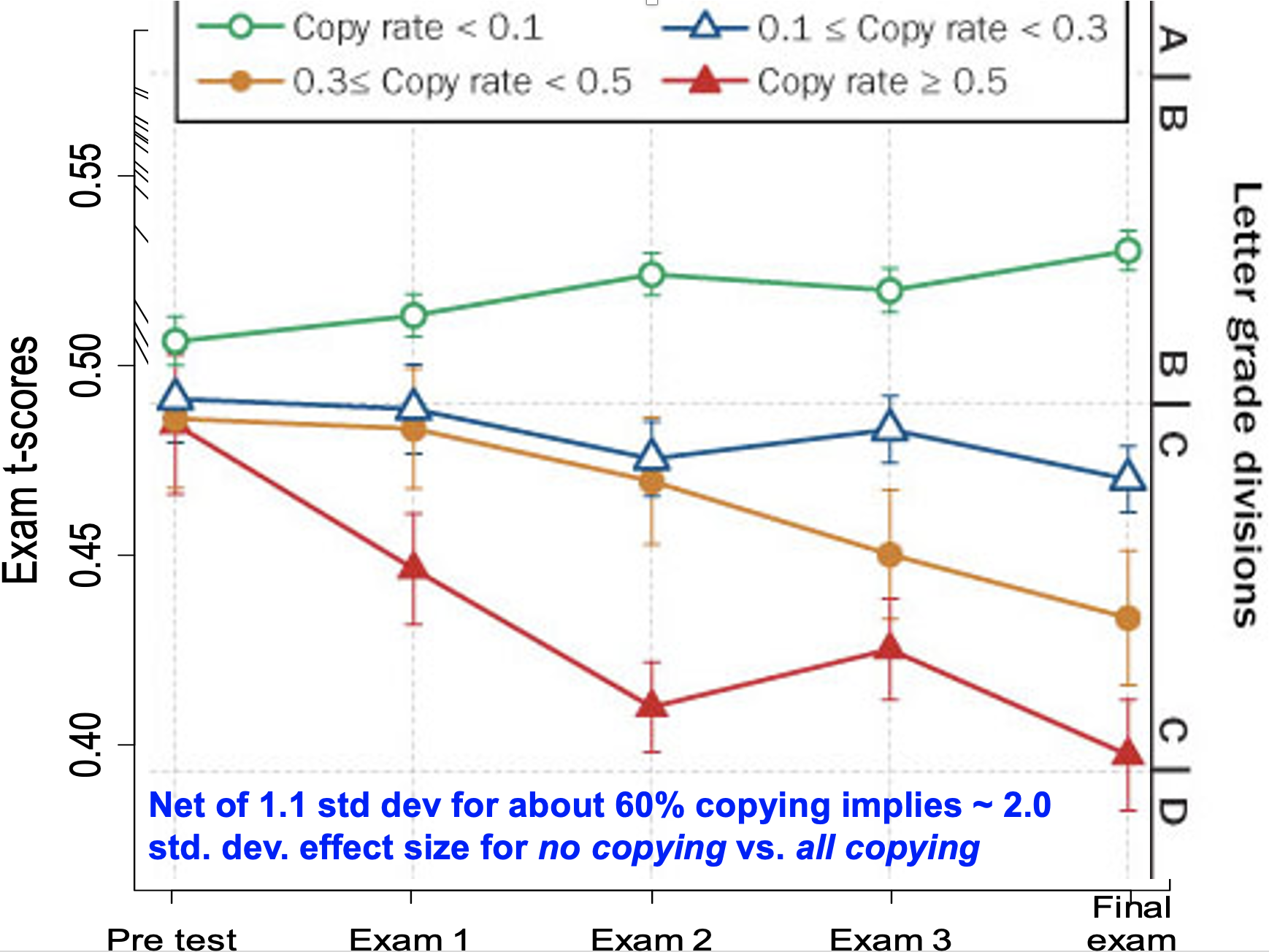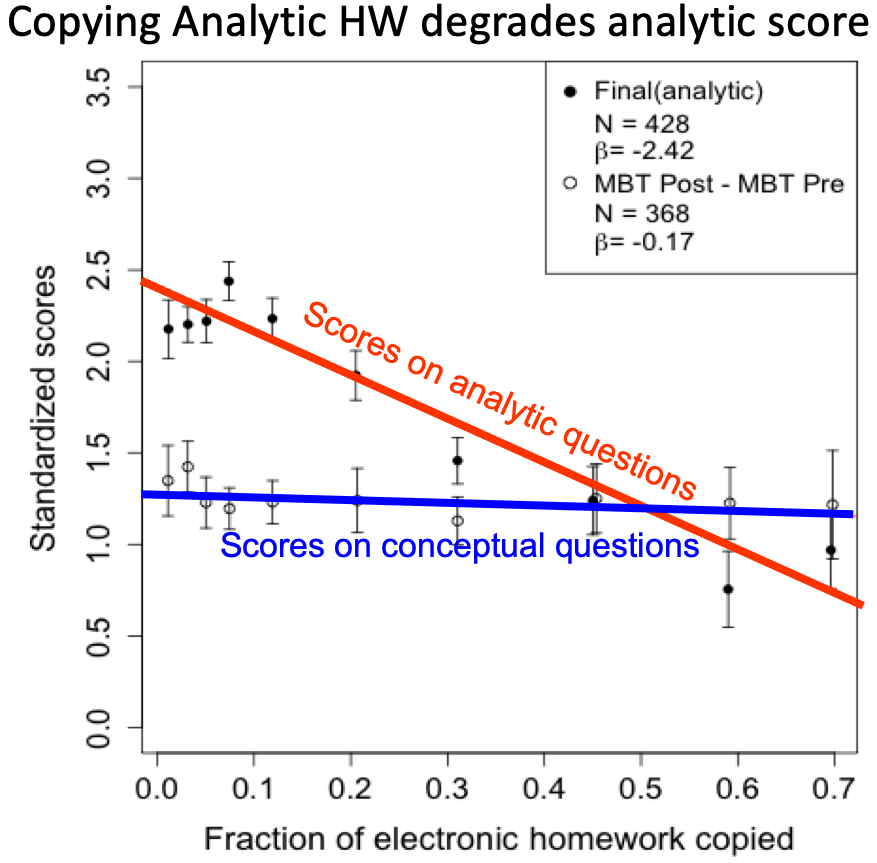Online Cheating Prevents Learning
The best predictor of the final examination score is Online Cheating – the dominant (anti-)determiner of learning. Our classic paper on homework copying is
PLW10 Patterns, correlates, and reduction of homework copying, Palazzo, D., Lee, Y-J, Warnakulasooriya, R. and Pritchard, D., Phys. Rev. ST Phys. Educ. Res, vol. 6, (2010), p. 010104 Res. 6, 010104 (2010).
We find the best predictor of the final exam score to be:
final exam score = − 0.47C + 0.26EX1 + 0.26S + 0.20D
where C = Online Homework Copying and EX1, S, and D are the first midterm, skill on online homework, and Diagnostic test respectively. Written homework has insignificant correlation, probably because we found about 60% more copying on it than on the online homework. Recitations are voluntary, and we suspect that marginal students more frequently attend them as the semester progresses, lowering the correlation.
We discovered that a student’s class rank in the number of homework problems copied is almost 4 times more predictive of their final examination grade than their score on the first midterm exam, and that students who copied over 50% of their problems had a 55% chance of failing to pass Physics 1 and Physics 2 on schedule (25% for those copying over 30%), even though their scores on the pretest were only 0.2 std dev below students who didn’t copy (and had only 10% chance of similar delay).
This shows the dramatic effects of copying online homework: groups of students who copy different fractions of their homework start with nearly equal ability (0.1 on t-score is one standard deviation), and diverge in strict proportion to the fraction that they copy.
Our methods of detecting copying work on problems demanding an analytic response (vs. multiple choice). This affects their score on the analytic problems on the final extremely strongly – roughly a 2 sigma effect (a magnitude usually associated with personal tutoring). But copying analytic answers does not have a dramatic effect on the change in a student’s conceptual ability – all students in the class gained slightly over 1 standard deviation between pre and post conceptual questions.
Our surveys showed that written homework is copied about twice as often as online homework, emphasizing what a serious educational problem academic dishonesty is. The recent arrival of companies like Chegg.com and CourseHero.com from which students can find answers to homework questions without consulting their classmates.
This work was based on WPP07 which identified homework copiers for problems requiring a symbolic (i.e. analytic) response(s) as “quick responders”, enabling us to identify copied problems. (We also developed a Bayesian method that gave similar overall results). We showed how copying built up over the semester, how it increased with length of assignment, that the majority of students (who copied <10% of their submissions) had done ~50% of their weekly assignment two days before it was due (a surprise to >90% of teachers) vs around 10% for those who copied >30% of their assignment and submitted 15% of their problems late (accepting a penalty for this). We showed how changes in course structure and grading structure reduced copying by ~ x4.
RAC17 Copying@Scale: Using Harvesting Accounts for Collecting Correct Answers in a MOOC Jose A Ruiperez-Valiente, Giora Alexandron, Zhongzhou Chen, and David E. Pritchard. Computers & Education Volume 108, May 2017, Pages 96-114 (Presented at 3rd Learning at Scale Conference, 2016)
Surprisingly, we found that cheating was rampant in (our) MOOCs (Massive Open Online Courses). Even though the certificates were of no academic value, we found that 7% of certificate earners “harvested” more than 20% of their answers from fake accounts they set up with false names. We distinguished two modi operandi: immediate and delayed batch.
AYR19 Are MOOC Learning Analytics Results Trustworthy? With Fake Learners, They Might Not Be! Giora Alexandron, Lisa Y. Yoo, José A. Ruipérez-Valiente, Sunbok Lee, and David E. Pritchard International Journal of Artificial Intelligence in Education pp 1–23, 2019
So prevalent is copying in MOOCs that we showed that copiers distort studies of online learning (e.g. their high homework scores but low exam scores cause negative correlation between doing homework and learning). It is even worse in courses for academic credit, suggesting that research on which course components are effective in these courses must account for its pernicious effects.


Comments